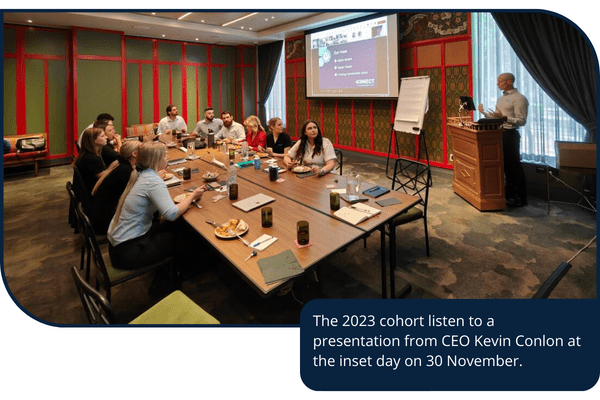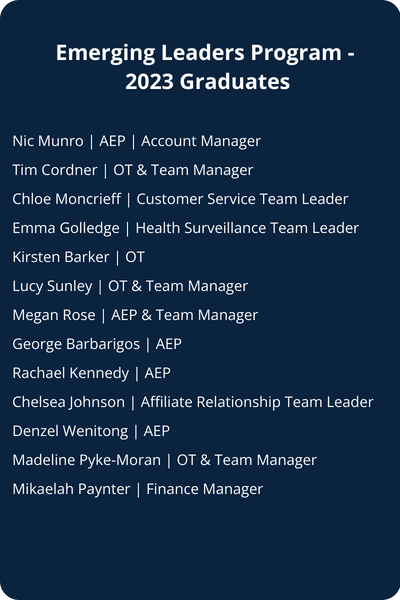Third cohort of KINNECT’s homegrown Emerging Leaders Program graduate at inset day
Our third, enthusiastic Emerging Leaders Program (ELP) cohort graduated from their 10-month-long learning experience at an inset day at Brisbane’s Ovolo The Valley Hotel on 30 November 2023. KINNECT’s CEO, and the program’s creator and facilitator, Kevin Conlon, explains how it has become an important investment in the organisation, and what the future holds.
Growing people to help more people
The ELP, in which 34 KINNECTers have participated since its inception in 2021, was created to fulfil a need to nurture leadership talent and encourage our people to excel in their current roles or advance into leadership positions to help the business expand.
“In 2020 I was thinking about our mission to help more people. To do that, we needed to grow the business, and for that we needed to grow our people.
“KINNECT’s growth started to accelerate when I moved some of my focus from becoming clinically better (helping people recover and get back to work quicker) to learning about how to make the business better. I did a course at MIT in Boston in 2013 and then other courses at Wharton and London Business School and brought back my knowledge.
“I created the ELP as I wanted to share my knowledge and give people in both leadership and non-leadership positions the opportunity to grow in our business,” Kevin recalled.
Learning, analysis and accountability
Through the ELP, KINNECTers who are eager to develop personally and professionally have been able to learn how the business works in a highly relevant way and develop leadership and communication skills that can be used in any role, from support services to service delivery roles.
Central to the program is reading, analysing and taking action on the lessons in several business and self-improvement books, a technique Kevin learned at MIT. “In my first year at MIT they said that if the average person reads 12 books geared to developing themselves each year, they’re in the top 5% of people in the world. So, I based the ELP around this concept,” Kevin recalled.
The program is delivered via two, one-hour sessions each month facilitated by Kevin or KINNECT’s Chief Operating Officer, Dave Hughes. One session is dedicated to a book review and discussion, then they set actions based on what they’ve learned. The group keep each other accountable for how they progress with their intentions.
The books selected have differed slightly over the program’s three years and have included Simon Sinek’s Start with Why: How Great Leaders Inspire Everyone to Take Action, Viktor E. Frankle’s Man’s Search for Meaning, The Five Disfunctions of a Team by Patrick Lencioni, and How to Win Friends and Influence People by Dale Carnegie. Shorter books with simpler, yet no less important messages, are introduced towards the end of the year to suit increased workloads with a final book chosen that ties all the lessons together.

The second session is used to share practical learnings from the participant’s previous book goals and examining the results of the Kulture survey for that month. “They get to understand why we ask the questions we do and why we are transparent with criticism. A foundation at KINNECT is that we only get better if we listen to and action feedback continuously,” Kevin said.
An in-person training day at the end of the year brings the participants together to consolidate their learning, celebrate each other’s progress, participate in mentoring and listen to guest speakers. This year’s guest speaker was ex-Wallaby David Croft who spoke about leadership not only as the captain of the Queensland Reds but also as a successful CEO of Croft & Co.
3 years on – progress and purpose
As early as the half-way mark of each year’s program, it’s clear to see that participant’s mindsets and behaviours are being changed*, but Kevin believes that we are seeing some other common points of progress:
“The really interesting take-away is that no matter what the person’s role is – management, support services, service delivery and those who aren’t managing – I see that:
- Everyone has an “aha” moment about why we do things the way we do at KINNECT. We call it the KINNECT WA
- People realise that, regardless of their role, they don’t have to have the title ‘Manager’ to be a leader. They can apply what they learn in slightly different ways. A consultant dealing with an injured worker can apply the same principles as they are leading their client to a specific result.
- Participants who are line managers not only come to an understanding about why we do certain things, they realise that there are things they can do to enhance their own work to get better outcomes.”
*You can read about what this looks like for some participants who are in clinical roles in this article: (Mind-set change for Emerging Leaders Program cohort as they pass half-way point KINNECT)
The program for 2024 has just opened for applications and it’s expected that it will again be oversubscribed, with some people applying for two years in a row. Kevin and Dave have taken feedback from previous ELP participants to improve the program including offering background into the choice of books, their own book reviews, further reading outside of the program, and an in-person training day at the both the start and end of the program. As for Kevin’s hopes for the future:
“I hope that we can continue to grow our people. I’d like to see how we could incorporate previous ELP graduates to help people in the new cohort. I’d also like a way for people in management positions to continue to grow where there is a balance between doing their job and getting better at their job. Plus, we’ll have more external speakers for the in-person training days,” he said.
What is clear, is that the ELP will be a permanent program for KINNECTers for the foreseeable future, driven by Kevin’s belief in investing in people:
“We’re in the helping people business and we need to invest in our people to get the best possible outcomes. This includes the ELP, plus our monthly culture surveys (which we’ve done for the last 10 years), the results of which we publish and share with our whole team. We also use scorecards for performance management and employees can request a review at multiple points throughout the year – not just at their manager’s request.
“I don’t know any businesses who do this [the ELP] – sometimes not even larger companies put effort into creating and running their own program. But it’s worth the investment. It’s simpler to bring others in, but I wanted to share my knowledge.
“The ELP helps people grow in their personal lives as well. I get thank you notes from people saying that they’ve got the professional tools and understanding to grow their emotional intelligence.”
If you’re seeking a career with an organisation who proactively supports your professional development, take a look at the roles available on our careers site.